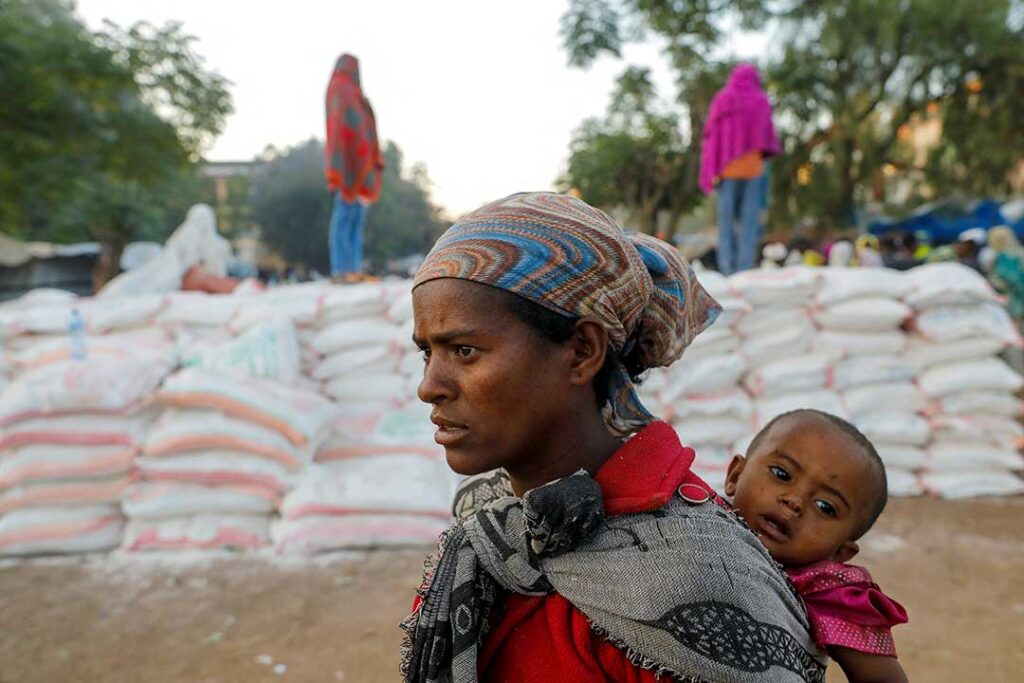ADF STAFF
More than one year after a peace deal was signed to end the war in Ethiopia’s Tigray region, the regional capital of Mekelle once again is bustling. Schoolchildren hurry through the streets, three-wheeled taxis jostle for position and Edaga-Seni, the city’s outdoor market, is full of vendors hawking their wares.
But observers say life in the wider region is far from normal.
“The guns have been largely silenced, we have seen improvements in access to services like banking and electricity, some schools have also reopened, but 90% of Tigray is dependent on aid,” Yared Berhe Gebrelibanos, who heads the Alliance of Civil Society Organizations of Tigray, told Agence France-Presse (AFP). “And the humanitarian situation is getting worse.”
The Pretoria Agreement was supposed to mark the beginning of rebuilding this shattered area. But a year later, more than 1 million displaced people are still living in squalid conditions where cholera and malaria are rampant. A study conducted by the Tigray Health Bureau found that 68% of Tigrayan deaths in the first nine months after the peace deal were due to starvation.
Mulu Tadesse lost her son in the conflict and now lives in a camp for displaced people in Shire, northwestern Tigray.
“If they agreed to peace, the displaced people should have returned home,” she told the BBC. “We would have gone home and started rebuilding. We were self-sufficient, but now we are looking for aid.”
Reconstruction also lags. More than 80% of the region’s health buildings, water infrastructure and schools were damaged during the war. Thieves looted shops and stripped factories of machinery and raw materials.
“The destruction in Tigray is so massive and it is easier to count what survived the war than to enumerate the destroyed sections of the social and economic infrastructure,” Dr. Mulugeta Gebrehiwot, a former director of the Institute for Peace and Security Studies at Addis Ababa University, wrote in an article for the World Peace Foundation at Tufts University.
But Mulugeta pointed out that little money has been set aside for reconstruction. He said the federal budget passed in 2023 allocates less money to Tigray than the region received before the war and does not include money specifically for reconstruction. “It looks as though the Federal Government is going to pass the responsibility of reconstruction to the international community,” he wrote.
Security also remains a challenge. In October, the United Nations’ Special Advisor on the Prevention of Genocide warned that “atrocity crimes,” such as ethnic killings and sexual violence, continue in Tigray. Despite the peace deal calling for the withdrawal of foreign troops, Eritrean forces still occupy areas near the border.
A woman living near the border told AFP that Eritrean troops continue to control trade and sometimes block roads and commit kidnappings. A man in the border area of Erob said Eritrea’s presence has prevented a return to normal.
“Since the signing of the peace agreement services such as banks, telecoms, and electricity, which were closed in most areas of Tigray, have been opened. But in Erob district, nothing has changed. Most of the Erob district are still controlled by the Eritrean army,” Hagos Tesfay told DW.com.
There are some rays of hope. An inclusive, interim administration is governing Tigray, and the federal government launched a transitional justice initiative, according to a report by the Institute of Security Studies (ISS). The National Rehabilitation Commission has begun the slow process of demobilizing, disarming and reintegrating an estimated 400,000 fighters. The process is expected to take two years.
“Peacebuilding is always a work in progress. Attaining tangible peace dividends will require sustained support of ongoing efforts to bring peace and rebuild social ties,” Fikir Mekonen wrote for ISS.
But for many who still are displaced and grieving, the progress is too slow. “Our children have passed away, and it’s been more than a year since the peace agreement; yes, we feel sad,” Mulu told the BBC. “If we can return home, it will feel like our children didn’t die in vain.”

